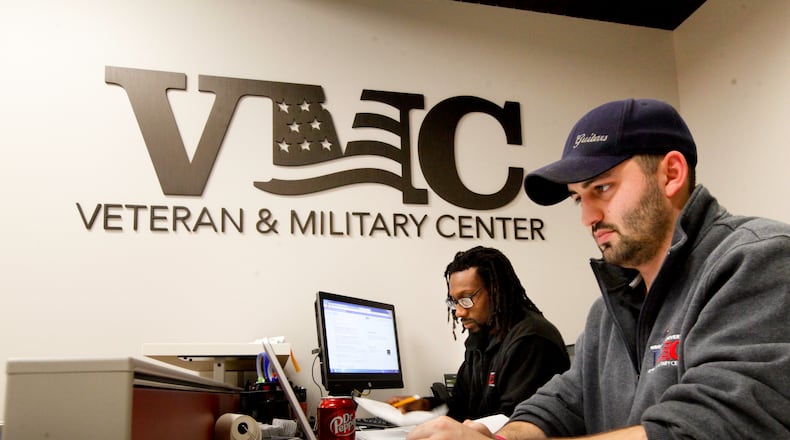The publication considered factors such as completion, retention, and grade point average in determining ranking followed by military-specific resources and financial assistance.
Seth Gordon, director of the Wright State Veteran and Military Center (VMC), said what veterans need from colleges and universities is actually simple.
“You want them to feel like they’re welcome,” Gordon said in an interview Thursday. “You want them to feel like they belong. When they walk in, you want them to feel like, we have resources for you.”
Schools need to get the financial and benefits side of an education right, he said. And they should strive to provide the space and programs veterans need.
And schools need to know who their veteran students are. Half of Gordon’s veteran students are married and in their 30s, for example.
“One of my students, she’s 38, and she has a 21-year-old daughter,” Gordon said. “She needs something very different than the 19-year-old who is a (National) Guardsperson, right?”
Veterans may bring a maturity to college that younger, more conventional students don’t yet possess.
But they may also bring challenges other students don’t have.
Those challenges can be big and small. If a student has a crucial VA medical appointment scheduled at the same time as an exam, for example, Gordon’s office will try to help that student navigate that.
His office has two full-time staff and 12 student workers.
“They have seen a lot more of life,” Gordon said of veterans.
Among Ohio universities, Bowling Green State University ranked highest, at 11th overall. Ohio State was ranked 57th. The University of Toledo was placed at 113, Ohio University was 175, and Cleveland State was 237. Youngstown State (259) was also listed.
Wright State said it serves about 600 veteran and military-connected students each semester.
The Ohio Department of Higher Education also named Wright State a Collegiate Purple Star campus for its efforts for military-connected students.
Becky Jones, manager of Sinclair’s Military Family Education Center, said veterans sometimes need help cutting through the red tape.
“It’s navigating some of the bureaucracy around the benefits and making sure that they’re maximizing it so they can focus on school,” Jones said.
This is the third year in a row that Sinclair has appeared on the Military Times list.
Each year, about 2,000 military-affiliated students, including veterans, active-duty, spouses, and children, study at Sinclair, the college said. In 2023, a record 490 military-affiliated students earned Sinclair degrees and certificates, a 40% increase over 2022.
“It’s not just a popularity contest,” said Scott Markland, Sinclair’s senior vice president of student development
Shannon Hansen, an Air Force veteran majoring in English with a concentration in professional and technical writing, said Wright State was the best choice for her.
“I was worried about fitting in as I am older than the average student,” she said in a Wright State release. “Also, with my PTSD challenges, I worried about interacting with so many people. The VMC has helped me through all of that.”
She credited Wright State with providing a “safe space.”
“They have listened to me vent, helped me through obstacles, encouraged me to be me by accepting me on my level, just as I am, understanding how difficult it is to ask and accept help,” Hansen said. “Without the support of the VMC, I am not sure I would be able to navigate this next chapter of my life at Wright State.”
About the Author


